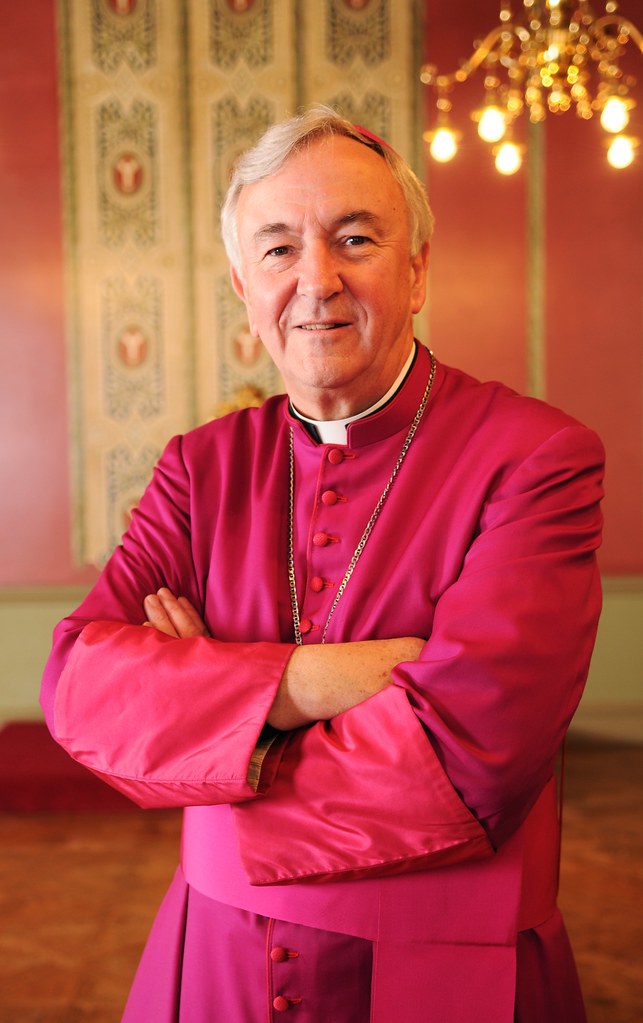
Advent and Christmas have a particular part to play in our lives. Advent gives us the opportunity to think afresh about the fact and meaning of the birth of Christ, the eternal word of God taking on our human condition. It is a great mystery for us to comprehend and I urge everyone to spend Advent preparing well for this joyous occasion. There are lots of material things that we prepare for when celebrating Christmas, let us not forget our spiritual preparations too.
God became incarnate in Jesus, in a tiny child, and in doing so offered humanity the hope of salvation and of a share in the divine life. The Eternal Love of God took on our flesh and blood in order to save us. This is the greatest gift of all and it should be foremost in our mind at this time.
May every act of prayer, work, gift giving and spending time with friends and family, reflect the love and generosity of the incarnation that we celebrate. May that same love and generosity shape our actions in the New Year as we try and follow Christ more faithfully in the Year of Faith.
On behalf of all the Auxiliary Bishops, I wish you and your families a peaceful and holy Christmas and my best wishes for the New Year.”

 Every year, the parish of Our Lady of Victories in Kensington, like many other parishes in the Diocese, erect a large outdoors crib. I am surprised but pleased to see how many children stop to look at it. I am surprised because it seems to me that so often young people are denied a true childhood of innocence and joy. This may be because of constant materialism which confronts them at every turn – the latest jeans, the latest trainers, the latest iphone, the latest and best of everything! Play is not so much a matter of imagination, getting messy and friendship, but more about computer games, fashion and Facebook. In the run up to Christmas, parents and carers find themselves pressured into showing their love simply by how much they spend. So I am pleased that the story of Christmas as shown in the simplicity of the Crib still attracts and entrances the young.
Every year, the parish of Our Lady of Victories in Kensington, like many other parishes in the Diocese, erect a large outdoors crib. I am surprised but pleased to see how many children stop to look at it. I am surprised because it seems to me that so often young people are denied a true childhood of innocence and joy. This may be because of constant materialism which confronts them at every turn – the latest jeans, the latest trainers, the latest iphone, the latest and best of everything! Play is not so much a matter of imagination, getting messy and friendship, but more about computer games, fashion and Facebook. In the run up to Christmas, parents and carers find themselves pressured into showing their love simply by how much they spend. So I am pleased that the story of Christmas as shown in the simplicity of the Crib still attracts and entrances the young.
Children are also denied a childhood by poverty, ill health and a lack of access to good education. In a significant number of families in our Diocese, children may be forced to work, or be kept at home to act as carers for younger siblings or sick parents. They may well have to take on responsibilities which are ill-suited to their young age. They may miss out on schooling. They may turn themselves to drug and alcohol misuse to forget their troubles.
The message of Christmas is that love is not about money or material possessions. Real love is about self-giving – just as God out of love for us all becomes man. The message of Christmas for those who have the care of children is that childhood is precious – God himself became a child and has sanctified childhood. We must do all that we can to ensure that children can enjoy true childhood of innocence and peace surrounded by real love and not a substitute for it.
May we all be blessed with a joyful and peaceful Christmas!

 My ideas about Advent are changing. For many years I have been happy to try to carve out a quiet time in expectation of the birth of Christ. That, in itself, is no mean feat, given the hard sell of the secular Christmas which starts in September and intensifies. Then I developed the idea of connecting the first coming of Christ with his second coming and the completion of his mission which is at the heart of much of our theology. More recently, I borrowed from the Fathers of the Church and considered the "Third" coming of Christ which is the recognition of the presence of Christ each day in the events of my life. And in this way I had begun my Advent this year. But events in the last few days have caused me to question my approach further.
My ideas about Advent are changing. For many years I have been happy to try to carve out a quiet time in expectation of the birth of Christ. That, in itself, is no mean feat, given the hard sell of the secular Christmas which starts in September and intensifies. Then I developed the idea of connecting the first coming of Christ with his second coming and the completion of his mission which is at the heart of much of our theology. More recently, I borrowed from the Fathers of the Church and considered the "Third" coming of Christ which is the recognition of the presence of Christ each day in the events of my life. And in this way I had begun my Advent this year. But events in the last few days have caused me to question my approach further.
In a short space of time I was aware of so many crises in our world whether in the violence in Syria, and the plight of so many Syrian refugees, in the lawlessness of Yemen – even renewed rioting in Belfast. I was particularly shaken by the news of the breakdown of Law and Order in Democratic Republic of Congo. I had visited Goma last year to meet partners of Cafod and been heartened by the good news of people returning to their land, developing sustainable livelihoods and rebuilding communities. It is heart-breaking to see all the progress being wiped away.
I found myself being rather dissatisfied by my rather inadequate approach to Advent of waiting for Christ to come to me. Advent needs still to be a preparation for Christmas but it is essential to take stock of the broken world in which we live which is not so different from the broken world into which Jesus was born. Remembering both the First and Second coming is fine. But the third coming is no longer waiting for Christ to come to me but to ask "Where may I bring Christ to others?"I well understand that we cannot single-handedly solve the problems of Syria or Yemen but we have our sphere of influence and we must demand of ourselves the highest standards of principles and behaviour in living the Gospel each day even in the most insignificant tasks that we undertake.
Pope Benedict calls us to celebrate a Year of Faith so that we can re-evangelise ourselves and celebrate our faith with joy and find new ways to communicate it to others. We have to know what we believe and why we believe it as we have important decisions to make which affect those around us. A return to the documents of the Council is helpful, not least to the document on the Lay Apostolate which says that we all have a place in continuing the work of Christ, of being his ambassadors.
We will "celebrate" Christmas but we will come to Christmas with a clearer understanding of our Faith, and our personal gifts and our spheres of influence. If we do that then we can begin to recognise the challenge presented by Newman in his meditation ...”God created me to do Him some definite service. He has committed some work to me which he has not committed to another”. Let’s use Advent to discover our purpose and to set about it with energy.

 This year I will celebrating Christmas Mass in a prison, HMP The Mount. It is a reminder to me that many people work on Christmas Day, e.g. prison officers, healthcare professionals, paramedics and police. Those in prison remind me that many people find Christmas a very lonely or difficult time. I think of those who are sick, some who live with a recent breakdown of a relationship and others who know the pain of grief.
This year I will celebrating Christmas Mass in a prison, HMP The Mount. It is a reminder to me that many people work on Christmas Day, e.g. prison officers, healthcare professionals, paramedics and police. Those in prison remind me that many people find Christmas a very lonely or difficult time. I think of those who are sick, some who live with a recent breakdown of a relationship and others who know the pain of grief.
In the prison settling the central message of the Incarnation, which can be obscured by tinsel and glitter, shines through. St. John’s powerful words “The Word became flesh and dwelt amongst us and we have seen his glory…” speak of the promise of God’s mercy and freedom from sin. As St. Athanasius of Alexandria wrote, the Word of God “was made man so that we might be made God; and that he manifested himself through a body so that we might receive the idea of an unseen Father, and he endured the insolence of men that we might inherit immortality.”
The Incarnation reveals to us the dignity of the human person. As St Basil writes, “Man, be mindful of your greatness, remembering the price paid for you: look at the price of your redemption and comprehend your dignity.” For this reason, the Church argues for the protection of human life from conception until natural death and the need for all means to respect persons, treat them with justice and to go the second mile in love.
As we gaze upon the Christ Child in the crib, the words of Pope Benedict help us to comprehend the mystery, “God is the foundation of hope, not any god but the God who has a human face and who has loved each us to the end, each one of us and humanity in its entirety” (Spe slave 31). The invitation to each one of us is to turn more fully to the Lord and deepen our meeting with him in prayer. We pray that the Lord may touch the hearts of those in prison and heal the wounds carried by the victims of crime.
May we all receive the blessings of this holy feast as we say to one another, Happy Christmas.





